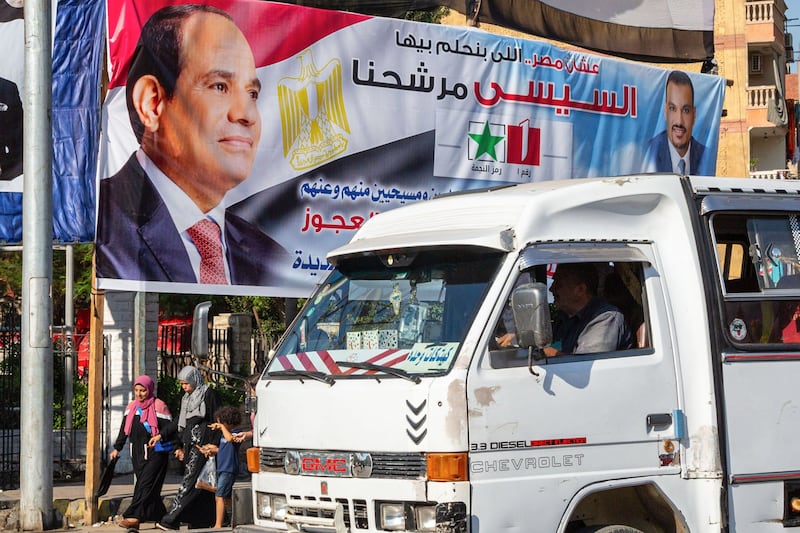Overseas voting began in Egypt’s presidential election on Friday, at 137 consulates and embassies in 121 countries.
The National Election Authority said voting would begin at 9am local time in each country and continue for three days before ballot boxes close on December 3.
Voting will take place at home from December 10 to 12 in Egypt and the results will be announced on December 18.
The first overseas voting booths opened in New Zealand at 9am, which was just after midnight in Cairo.
Egypt’s general consulate in Australia opened soon after, followed by Asian countries including China, Japan, North and South Korea and Indonesia.
Egyptian consulates and embassies in several Arab countries including Saudi Arabia, the UAE, Kuwait, Tunisia and Lebanon opened voting booths on Friday morning amid large turnouts, with Egypt's state TV showing queues in Riyadh and Abu Dhabi.
Busloads of Egyptians carrying flags and dressed in national colours were shown arriving at voting centres in both cities.
Gulf countries host some of the world's largest Egyptian expat populations, with Saudi Arabia home to 1.47 million Egyptians and the UAE more than 430,000.
TV footage also showed voters arriving at consulates in European capitals including Rome, Paris, Berlin and Vienna.
Voting in the US, home to the largest segment of the Egyptian diaspora outside the Arab world with about 250,000, was to open later on Friday because of the large time difference.
The consulate in New York City, which serves more than 50,000 Egyptians living in 13 east coast states in addition to New York, is prepared for an influx of voters over the next three days, consul Huwayda Issam told the state-affiliated Al Qahera News on Thursday night.
During past presidential elections, Egyptians have rallied around the consulate in New York to voice their support for one candidate or another. Some come from states that are hundreds of kilometres away from New York, Ms Issam said.
The consulate has made arrangements with the New York City Police Department to partially close off the street where the Egyptian consulate is in anticipation of the large crowds expected to arrive over the next three days, the consul said.
Voters will only need to prove their identity through their national identification numbers, Egyptian ambassador to Lebanon Alaa Moussa told Al Qahera on Friday morning.
The ambassador said a valid ID card or passport will not be required to make it easier for everyone to vote.
It is common for Egyptians abroad to not renew their state-issued ID documents, Mr Moussa said.
As with every year, candidates are running with election symbols, still widely used in Egypt because of widespread illiteracy in rural provinces.
Aside from incumbent candidate Abdel Fattah El Sisi, who is widely expected to win the election, three other candidates are in the running this year. Mr El Sisi's election symbol is a star.
Candidate Hazem Omar, an engineer and parliamentarian who conducted a hasty campaign after announcing his bid in July, has been largely ruled out due to his inexperience and overly liberal position, analysts told The National.
Another candidate, Farid Zahran, a socialist thinker and the opposition bloc’s candidate, is widely considered to be running as a token leftist.
He conducted a low-budget campaign that was only finalised a few weeks ago after squabbles between the country’s opposition parties over who would be fielded as their candidate for this cycle.
Ahmed Tantawi, head of the Nasserite Al Karama Party, had been the clear opposition front-runner.
However, he was not able to secure the minimum endorsements and has since been charged with circulating elections documents illegally.
Mr Tantawi, along with 21 of his campaign staff, are to stand trial on December 5, his wife journalist Rasha Qandil said on social media platform X.
Gamila Ismail of the Al Dostour Party had also announced her intention to run as the opposition candidate but withdrew her bid in September.
The other candidate is Abdel Sanad Yamama of the historic Al Wafd Party.
A run-off vote has been scheduled for January if no candidate receives 50 per cent of the ballots.
The election takes place as Egypt continues to battle what Prime Minister Mostafa Madbouly described in 2022 as the worst economic crisis in more than a century.
Inflation has hit record highs as the local currency has lost over half of its value since a series of devaluations began in March 2022.







